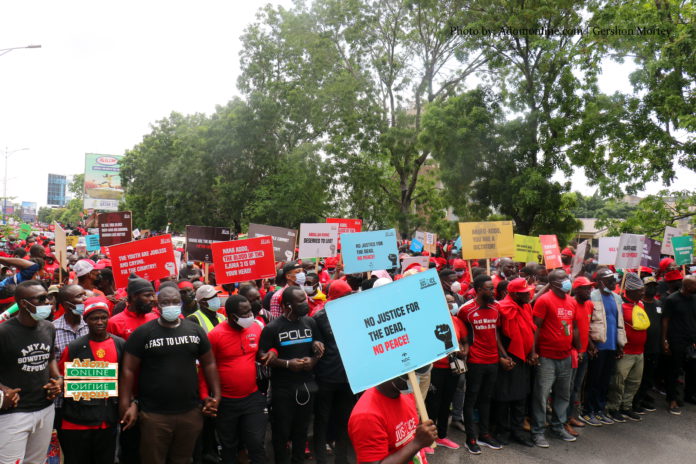The National Peace Council (NPC) has identified violent demonstrations, farmer-herder conflicts and violent communication through the media as some of the biggest threats to the country’s peace.
They also cited chieftaincy and ethnic dispute, armed robberies, the proliferation of arms and drug trafficking as part of these domestic threats.
In the view of the NPC Chairman, Rev Dr Ernest Adu-Gyamfi, these domestic threats coupled with the spread of extremist groups in West Africa including Ghana, if not checked, could undermine the development and growth of the sub-region.
Dr Adu-Gyamfi explained that the council is preparing itself “to play its part in dealing with such threats.”
He further observed that “it is refreshing, therefore, to receive, once again, support from the Commonwealth Secretariat to build the capacity of the National Peace Council.”
“This training is expected to help us facilitate and continue to work within our communities to promote peacebuilding, facilitate social cohesion, deepen inter-faith harmony and cross-cultural understanding in the context of global citizenship, as a way of preventing and countering violent extremism,” he added.
The two-day capacity building workshop is on the theme ‘Preventing and Countering Violent Extremism in Ghana.’
Read the NPC Chairman’s full speech below:
CHAIRMAN’S SPEECH – P/CVE TRAINING FOR BOARD & REGIONAL CHAIRMEN OF THE NATIONAL PEACE COUNCIL
Eminent Board Members
Mr. Mark Albon, Head of CVE Unit, Commonwealth Secretariat
Chairmen of the Regional Peace Councils
Executive Secretary of the NPC
Executive Secretaries of the Regional Peace Councils
Media
Ladies and Gentlemen,
I am happy to open this workshop this morning for two main reasons. First, it offers me and the Board of the NPC the opportunity to meet with all the Chairmen of the Regional Councils for the first time since the new Governing Board of National Office Council assumed office in November 2020.
Secondly, this meeting helps to close the gaps that exist between the Governing Board and the Regional Councils, as it allows the members on both sides to fraternize, create new bonds and strengthen existing ones.
It is my expectation that by the close of the two days training session, relations between the Governing Board and the Regional Councils would have been better harmonized and synergised for greater efficiency in discharging our collective mandate as indicated by the National Peace Council Act.
I have been informed by the Secretariat that this is the first time a governing board of the NPC is meeting all the Regional Chairmen of the Peace Council. I would like to thank the Commonwealth Secretariat and Amy Longland for working hard to make this dream a reality.
Ladies and Gentlemen, this programme — which is a capacity building workshop on preventing/countering violent extremism (P/CVE) — has come at a right time, for the Board, Regional Peace Councils, Regional Executive Secretaries and Management of the Head office, considering the threat posed by terrorism and violent extremism activities in the Sahel and other neighbouring countries even though Ghana has consistently been celebrated as a stable democracy.
The threat of terrorist and violent extremist attacks have heightened discourse within the security circles in Ghana. Given the porous borders across the sub-region, there are growing fears of the spread of extremist groups across West Africa including Ghana.
Other notable domestic threats which provide fertile grounds for violent extremist actions include chieftaincy and ethnic clashes, farmer-herder conflicts, violent demonstrations, armed robberies, proliferation of arms, drug trafficking, political polarisation, vigilante groups, kidnappings and violent communication through the media.
Within this context, it is important that the National Peace Council prepares itself to play its part in dealing with such threats. It is refreshing therefore to receive, once again, support from the Commonwealth Secretariat to build the capacity of the National Peace Council.
This training is expected to help us facilitate and continue to work within our communities to promote peacebuilding, facilitate social cohesion, deepen inter-faith harmony and cross-cultural understanding in the context of global citizenship, as a way of preventing and countering violent extremism.
The capacity building programme is in two parts. The first part, which was training for 40 young people titled “Faith in the Commonwealth (FiCW), has been completed. We are here to undergo the second part of the capacity building programme.
I would like to use this opportunity to thank the Commonwealth Secretariat for supporting the National Peace Council to hold this important programme.
We are grateful and would like to reiterate the importance the National Peace Council attaches to the partnership it has with the Commonwealth Secretariat.
I would also like to commend the Executive Secretary and the staff at the National Peace Council, and Countering Violent Extremism Unit of the Commonwealth Secretariat, for their hard work in putting this programme together.
Lastly, I urge Eminent members, Chairmen of Regional Peace Councils, Regional Executive Secretaries and Management of the National Peace Council to take advantage of this training session, add value to themselves and position the Council to deliver its mandate effectively.
You are welcome to Accra and to the Hillview Hotel
Thank you!

